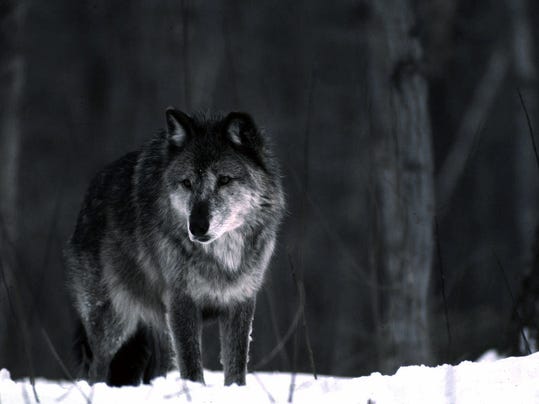A 2013 hunt netted 23 wolves, just more than half the 43-wolf quota.(Photo: Dave Kenyon / AP)

A group of wolf experts disputed Monday that gray wolves in Minnesota,
Wisconsin and Michigan are endangered or that a judge's ruling will help
the region's population spread to other states.
A federal judge on Friday threw out the Obama administration's decision
to remove wolves in the three states from the endangered list. The move
banned sport hunting and trapping of wolves in the region, where the
combined population is around 3,700.
The U.S. Fish and Wildlife Service dropped federal protections in the
three states in 2012 and returned management to the states. U.S.
District Judge Beryl Howell in Washington, D.C., ruled that the decision
violated the Endangered Species Act. She said state regulation was inadequate, and that the animals still inhabit only a fraction of their former range.
The federal government could appeal. Service spokesman Gavin Shire said
Monday that the agency is still determining its next steps.
In a conference call organized by the International Wolf Center in Ely,
regional wolf experts including David Mech of the U.S. Geological Survey
in Minnesota, who's vice chair of the center, said hunting and trapping
as it was regulated by the three states did not threaten the species'
survival.
The ruling means the wolf population probably will grow some in
Wisconsin, said Dick Thiel, a retired wolf biologist formerly with the
Wisconsin Department of Natural Resources. He predicted less expansion
in Michigan's Upper Peninsula because there isn't room for many more
wolves there.
Wolves might migrate from Minnesota and repopulate parts of North Dakota
and South Dakota if the protections remain in place, but not other
states, Mech said. "I don't think for a minute that wolves are going to repopulate Iowa or
Indiana or Illinois because people just won't let them," Mech said.
While an occasional wolf from the region has been spotted as far away as
New York state or Kentucky, he said, they get hit by cars or people
shoot them.
The Humane Society of the United States, which filed the lawsuit, says
the judge got the decision right. Wayne Pacelle, its president and CEO,
said the researchers on the call were all proponents of wolf hunting and
trapping. And he pointed out that this was the fourth time a federal
judge had rebuffed the federal government's efforts to take the region's
wolves off the endangered list. "These were not people who've been on the sidelines for a while. These
are people who've always been proponents of the trophy hunting and
trapping of wolves," Pacelle said. "And they were undoubtedly on the
other side of the three prior federal court cases. So this is 0-for-4
for them."
Gray wolves have been a flash point like no other animal that the
government has tried to take off the endangered list, said Mike
Phillips, executive director of the Turner Endangered Species Fund, who
was project leader for wolf restoration in Yellowstone National Park. "Because the law is a bit ambiguous, and because gray wolves are a very
romanticized species, the whole thing is caught in a great deal of
controversy and divisiveness that manifests itself in all these
political theaters around the country," Phillips said.
Mech noted that Congress stepped in to take wolves in Idaho and Montana
off the endangered list after the courts ruled that they should stay on.
He said Congress might do the same thing for the Upper Midwest.
Pacelle acknowledged that that's a possibility. But he pointed out that
Michigan voters decided last month to stop wolf hunting and trapping,
and predicted that Minnesota and Wisconsin voters would do so if given
the chance. "The Congress is fully capable of engaging in unwarranted political
interference in endangered species cases, but that should not be driving
decision-making now," Pacelle said.



No comments:
Post a Comment